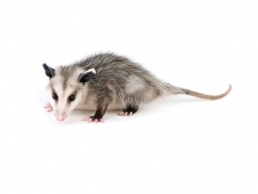
Opossums in Greater Boston
Opossums Description
The Virginia opossum is the only marsupial found north of Mexico in North America, where they live in urban settings, woodlands, and open fields. They are perhaps best known for “playing dead,” a defense mechanism used to appear less appealing to predators. Opossums are nocturnal and omnivorous, taking advantage of any food source they come across. Their diet consists of insects, small rodents, amphibians, fruits, berries, garbage, and even untended pet food.
Opossums Appearance
At about the size of a house cat, opossums grow to around 16 inches long and weigh anywhere from 6 to 12 pounds. Including their tails, opossums can reach up to 3 feet long. They are identifiable by their gray fur, white, pointed faces, and the long rat-like tails they use to help them climb. Opossum feet look like small hands with five fingers each. Their back feet contain opposable thumb digits that also help with climbing.
Opossums Habitat
Though they are found throughout the country, opossums cannot survive in areas of extreme cold, like the higher elevations of the Appalachians. The marsupials prefer wooded areas near sources of water like streams, wetlands, swamps, and thickets, but will also inhabit areas of brush and open fields.
Although they are excellent climbers and have been known to live in tree cavities, they prefer to den on the ground in old woodchuck burrows, brush/woodpiles, or spaces under decks or patios – they do not dig burrows. Highly adaptable, opossums survive easily in urban environments.
Opossums Problems
How Opossums Make Entry
Opossums can indeed find their way into homes, though it is usually by accident. The animal may enter through pet doors in search of food or shelter. More commonly, though, they will take up residence under porches, sheds, decks, and brush piles. When searching for food, they target garbage cans, gardens, pet foods, and compost piles.
The Damage Opossums Can Cause
As is the case with most wild animals, opossums become aggressive when they are cornered. They will bite, scratch, bare their teeth, and hiss in order to escape. Pets and people alike may be harmed in the presence of aggressive opossums and are then susceptible to the diseases they carry, such as tuberculosis, tularemia, and Chagas disease. Additionally, the marsupials can be infested with parasites such as fleas, ticks, mites, and lice.
Opossums Control and Safety
In order to keep opossums out of yards and homes, habitat modification efforts can be employed. Remove overgrown shrubs and grasses to limit hiding places. Bring pet food in from the outdoors and secure trash can lids to limit food sources. Finally, building fences around gardens can restrict the pest’s access to easy meals.
Opossums Trapping and Removal
As opossums carry various diseases and have sharp teeth and claws, individuals should never try to trap the animal without professional assistance. Critter Control wildlife removal specialists have the proper training, knowledge, and tools to capture and remove pest opossums from homes and businesses. Contacting trained professionals keeps families and pets safe and disease-free.
We can help you get rid of opossum problems.




